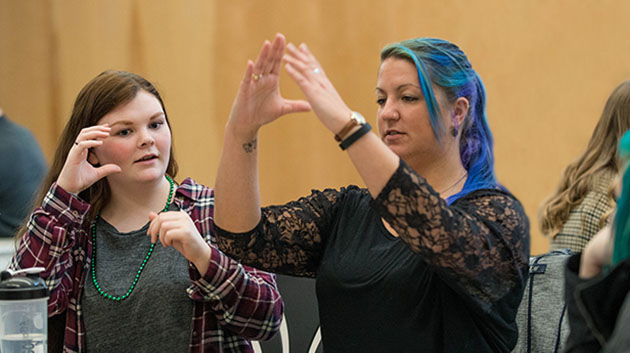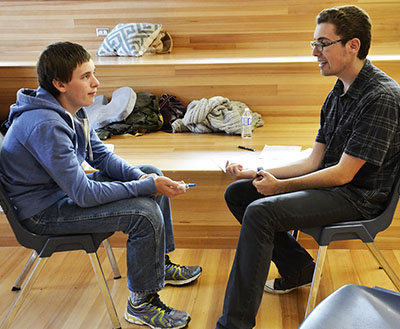Multi-level mentoring program matches UFV and Chilliwack Secondary students

Think about about those little Russian dolls. The smallest doll is surrounded by a larger one, which is in turn enveloped by an even bigger one, which is finally held safely by the largest doll of all.
A healthy community is sort of like these dolls.
The youngest and most vulnerable are cared for by the older and wiser members, who in turn receive the support of teachers, professors, and other professionals in the community. It’s the type of caring society a new program involving UFV students as mentors is hoping to create
and foster.
The Human Services Career program is an innovative project aimed at providing support to Chilliwack’s most vulnerable children, while developing the next generation of “natural helpers.” A partnership between Chilliwack Secondary School, the University of the Fraser Valley, the provincial Ministry of Children and Family Development, and Big Brothers/Big Sisters of the Fraser Valley, it has been running since September 2015.
Steve Anderson teaches psychology at Chilliwack Secondary and is the liaison from his school for this program. Counsellors Joe Ogmundson (recently retired) and Gloria Beshara, and Vice Principal Jessica Adams-Loupret were also involved in planning the program.
Anderson has long been aware of the value of encouraging supportive relationships between students, and is looking to formalize the process with this mentoring project.
“A student was telling me about a mentoring experience she had and how she herself was changed by the process of interacting with the younger student. It got me musing about getting high school students into the elementary classroom to befriend little folks. And then I thought, why not bring university students in to mentor our students?”
At the core is his belief that any interaction with an older, caring, trained individual will be beneficial for the elementary students. The secondary students, being closer in age to the younger ones, will be easier to relate to than adults might be.
“These interventions will change the younger students’ lives for the better. If you can influence someone at the beginning of their life, or as close to the beginning as you can get, you can have a real impact.”
— Steve Anderson, CSS teacher.

“These interventions will change the younger students’ lives for the better. If you can influence someone at the beginning of their life, or as close to the beginning as you can get, you can have a real impact. If you do something good for a little person, you can’t take that back. It’s life-changing when you realize that somebody cares about you.”
As for pairing his secondary students with UFV students as mentors, he sees it as a way of fostering self-confidence and self-awareness in the Grade 10s.
“By having them associate with UFV students, we are inviting them up the maturity ladder.”
Anderson shared his idea with Rob Lees of the Ministry of Children and Family Development, and they started planning and drawing in partners. From this inspiration, the Human Services Career program was born.
They designed a program that would prepare secondary students to mentor younger elementary-age students, and also aid in their own personal development.
Annette Vogt, a faculty member in the School of Criminology and Criminal Justice at UFV, saw the value in the vision and signed on to help organize it and recruit UFV student mentors. Other UFV representatives, including mindfulness expert Christine Slavik, have been involved in presenting at the Saturday workshops.
“The challenge is that there are a significant number of inner-city elementary schools in the community where students have a lot of need, and can use extra support,” Vogt notes. “The idea was that we would leverage the enthusiasm of the ‘natural helpers’ among the high school population, and deepen their involvement in their school
and community, and they in turn will help foster connection, learning, and engagement with younger students with whom they are paired.
“As a key part of the process, we would connect them with a UFV student mentor for the training process throughout the course of their Grade 10 year. Pairing them with a UFV mentor helps them see themselves as a future UFV student, and makes the idea of going to university more of a reality. And it’s a good experiential learning opportunity for the UFV students and a chance to develop their leadership and counselling skills.”
So far, 20 UFV students from a variety of programs, including Psychology, Social Work, Criminology, Child and Youth Care, and Kinesiology have signed on to be mentors. Some graduated from Chilliwack Secondary, making it a full-circle experience.
To help pair the UFV students with Grade 10 students and handle liability issues, the group turned to an expert: Collette Bohach, mentoring coordinator for Big Brothers/Big Sisters of the Fraser Valley.
“This whole initiative is helping to create a culture of mentorship for both the secondary students and the UFV students,” she notes. “I love the fact that when you walk into the room during our training sessions, everyone is the same: enthusiastic about the activity of the day and learning from each other. And it’s great that the current mentees will serve both as mentors for young children and for their eventual replacements: new Grade 10s in a couple of years’ time.”
She echoes Anderson’s belief that the youth mentors will have a positive impact on the elementary children.
“Teenagers have an instant credibility with kids.When they see the older teens, the younger kids’ faces
shine and say ‘you’re here for me.’”
As the program progresses, UFV researchers will be involved in monitoring and evaluation. UFV professor
Yvon Dandurand and graduate students from the MA in Criminology and Criminal Justice program are working together on designing evaluation tools. Data collection is underway.
“This partnership is a positive one in so many ways,” says Vogt. “It meets UFV’s mandate of contributing to the social and cultural development of our communities and gives our students the type of experiential learning that’s vital to their education and development. As a big plus, as a result they are helping younger secondary students and, ultimately, helping to improve the lives of children.”
How it works
- University students are teamed up in a mentor relationship with Grade 10 students from Chilliwack Secondary.
They participate in voluntary Saturday sessions designed to help prepare the Grade 10s to be peer helpers to elementary students. - Sessions include Peer Counselling, Resiliency and Anxiety Prevention, Mindfulness, Aboriginal Awareness, and Human Rights.
- Grade 10 and university students participate together, interpreting the material and learning from one another.
Graduate students enrolled in master’s programs in counselling help both the Grade 10s and the UFV students. - Grade 10 students have the chance to shadow their university mentor for part of a school day and observe their UFV classes.
- When the Grade 10 students enter Grade 11, they will volunteer in one of the five inner-city elementary schools, offering mental health literacy programs and acting as a buddy to younger elementary-aged students.
- When the Grade 10 students enter Grade 12,they will have meaningful work experiences within community agencies.
- The mentorships will emphasize fun, one-on-one informal interaction, conversation, and encouraging the younger student to try new things and develop skills.
- When the current Grade 10 students are in Grade 12 or university, they will have the chance to mentor a new group of Grade 10 students.
What the UFV mentors are saying:
“I wanted to be a part of the partnership because it was a fantastic volunteer opportunity that would give me relevant experience in the field of human services. I have learned a great deal about peer counselling, self-awareness, meditation, and cultural awareness so far in the program, which has all been very beneficial. Honestly, my favorite part about being a mentor is being able to learn from the kids that I’m supposed to be mentoring. I think there are a lot of great benefits that mentees have from participating. The program has taught them a lot of skills that will be relevant in many areas of their lives. It is also a lot of fun. I think that one of the greatest benefits that my mentees will have is an opportunity to visit a university class. I wish that I had had that opportunity when I was in high school. Experiential learning like this is a fantastic complement to theoretical studies. I think this is a fantastic program that is very beneficial to both mentors and mentees alike.”
— Danielle Deagle, UFV Psychology honours,
with an extended minor in Criminology (graduated in June 2016).
“I love sharing some of my own wisdom with people; talking to youth about what their dreams are is something that I feel proud to be able to do. I get to share a lot of laughs and see young people inspired and enthused about learning; it makes me very happy to know that young people are getting the opportunities to learn about a subject they are excited about. To me, the benefit of doing this is that I believe that these young people will go on to do great things. I feel that I can offer them some guidance, but also serve as a model for how one can progress from the program to university.”
— Sean Morden, third-year student, UFV Child and Youth Care degree program

What the mentees are saying:
“I knew that there was more to psychology than what I could learn in class, and that this program would be beneficial for me. My mentor is somewhere in the middle of where I am now and where I eventually want to be. He can help me connect to the material we are learning because he brings more experience to it.”
— Dean Wallin, Grade 10 student
“I like getting to know more about how we learn and how we change as we grow. Having a mentor taking the program with me means I have someone who’s easy to talk to and who brings knowledge and insight to the process.”
— Paige Morrison, Grade 10 student
“It was helpful to have someone older who has had different experiences than me learning beside me. I’m looking forward to passing on what I’ve learned.”
— Citlalli Gonzalez, Grade 10 student





